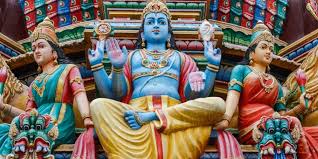The Hinduism is the third largest religion in the world (about 1 billion faithful) and probably the most complex.
It encompasses almost all the religious traditions of that region (with the exception of Buddhism and Jainism).
The word Hinduism is of Persian origin to refer to the Indus River (Hindu) and refers to all peoples who lived in the Indian subcontinent.
In Hinduism, there is no founder, as in other religions.
From this, the deities (which can reach millions) are part of everyday life. Even though there are temples, worship is usually held in homes, where there are altars for favorite gods.
In this belief system, dogmas are not rigid, which allows the incorporation of varied traditions.
However, sacred texts are largely respected, mostly written in Sanskrit. Of them, the Ramáiana and the Maabárata stand out , with religious and philosophical treatises, as well as mythical narratives about the rulers of ancient India.
Hinduism Customs and Beliefs
It is common among Hindus to practice singing (especially mantras), meditations and reciting religious texts.
Usually, the rituals involve offerings to the gods, worshiped in the form of images and meditations.
Among the Hindu rituals , we can mention:
- The Annaprashan , the first occurs when food intake;
- the Upanayanam , initiation into formal education for children of higher castes;
- the Shraadh , in which honors the deceased at banquets.
Another important aspect refers to death and cremation, considered almost always mandatory. Not infrequently, Hindus also practice pilgrimages , in which the favorite destination is the river Ganges .
Another well-known aspect in Hinduism is the mantras , prayers in the form of intoned sounds that aid concentration during meditations. The best known mantra is “ OM ” ( Aum ).
The belief in reincarnation is another remarkable fact in this religion. Based on Karma , a moral law of cause and effect, reincarnation is the continuous cycle of rebirth to which we are subjected, called Samsara .
It ends when Nirvana ( moksha ) is reached, a state of detachment and self-knowledge that is only reached by the most evolved spirits and who no longer need to reincarnate.
Remembering that among Hindus, a soul can be reincarnated many times and in different forms (animals and plants).
The veneration of images is another strong point, since the image is considered as divine manifestations, for which there is a specific iconography in artistic terms.
Another curious fact is the amount of deities worshiped, reaching millions of different entities.
However the trinity ( Trimurti ): Brahma (creator of the Universe), Shiva (Supreme God) and Vishnu (responsible for the balance of the Universe) is the most popular.
Other deities, such as Ganesha (God of wisdom), Matsya (savior of the human species) and Sarasvati (matron of the arts and music) are also highly worshiped.
Finally, the gods (or devas) have many epic accounts in the Puranas, where their descent to Earth is narrated, in divine incarnations called “Avatars”.
History of Hinduism
Considered one of the oldest religions of mankind, Hinduism has its origin in prehistory and dates back to Ancient India .
However, it is in the pre-classical period (1500-500 BC), Iron Age of India, that the Vedas will be written by the Aryan invaders, instituting a uniform set of beliefs and forming Vedic Hinduism , where the tribal gods were worshiped.
Thereafter, the Brahma-Vishnu-Shiva trinity will mark the period known as Brahmanic Hinduism .
Finally, Hybrid Hinduism will begin with the advent of Christianity and Islam.
It is important to remember that Hinduism was the path chosen by Indians for freedom in the 19th century, when Mahatma Gandhi led them, by peaceful means, to political independence.

